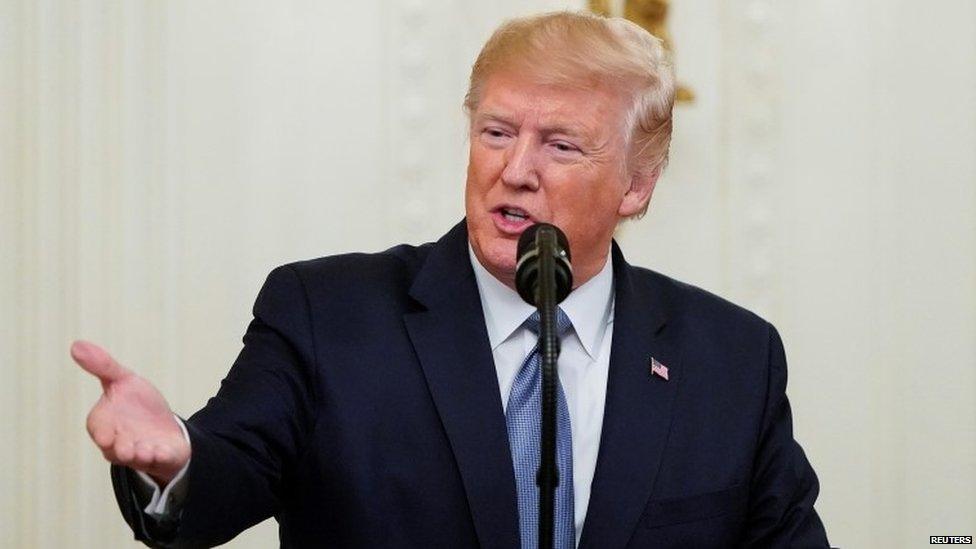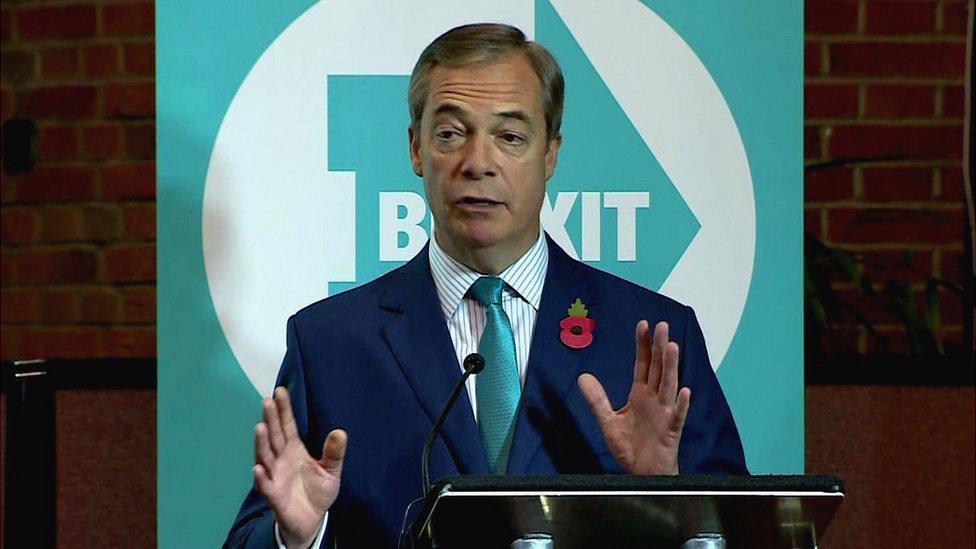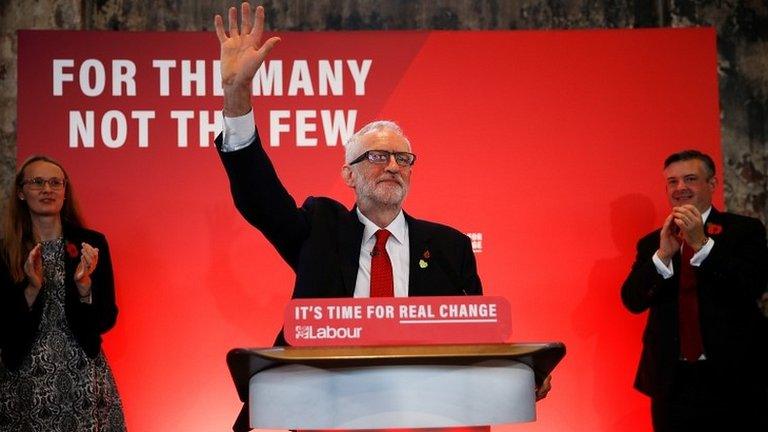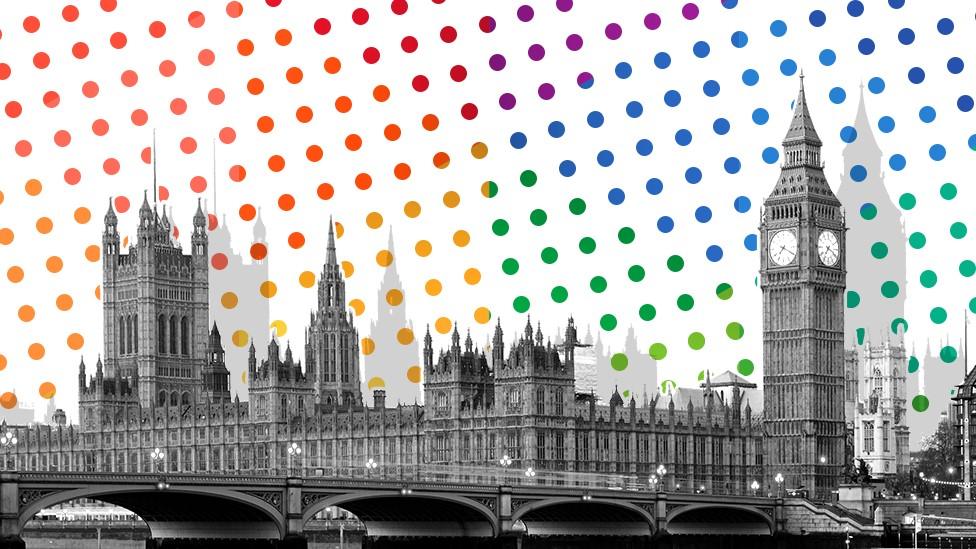General election 2019: No 10 defends Brexit deal after Trump criticism
- Published
Donald Trump criticises Boris Johnson's Brexit deal
The government has defended the UK's Brexit deal with the EU, following criticism from the US president.
Donald Trump said the US "can't make a trade deal with the UK" under Boris Johnson's EU withdrawal agreement.
A Number 10 spokesman said Boris Johnson had not spoken to Mr Trump about his Brexit deal, which was "agreed after they were last in touch".
Other comments made by Mr Trump led Labour to accuse him of trying to "interfere" in the election.
Speaking to LBC, external, the president said Mr Corbyn would be "so bad" as prime minister and that Mr Johnson was "the exact right guy for the times".
Mr Corbyn accused him of "trying to interfere" in the UK general election to boost "his friend Boris Johnson".
The UK is going to the polls on 12 December following a further delay to the UK's departure from the EU, to 31 January 2020.
Mr Johnson hopes to win a majority of seats so that he can get his deal through Parliament - while Mr Corbyn promises another referendum if he wins the keys to 10 Downing Street.
But Mr Trump said his longstanding ally Mr Farage - leader of the Brexit Party - should team up with Boris Johnson to do "something terrific", saying they would be "an unstoppable force" in the December poll.
Mr Farage's party is due to hold its campaign launch later amid speculation about whether they will field MPs in every seat or stand down candidates to help Tory Brexiteers win.
Speaking on LBC this morning, Mr Farage said his view was there needed to be "some kind of alliance" - but he would not comment on whether the Brexit Party would be fielding "20 or 200 candidates".
Donald Trump met Boris Johnson in September and said he was "doing very well"
In August, Mr Trump promised a "very big trade deal" with the UK and predicted that leaving the EU would be like losing "an anchor round the ankle".
But speaking to supporter Nigel Farage on LBC, Mr Trump was critical of the withdrawal agreement Mr Johnson recently reached with EU leaders.
Mr Trump said: "We want to do trade with UK and they want to do trade with us."
But he added: "To be honest with you... this deal... under certain aspects of the [Brexit] deal... you can't do it, you can't trade.
"We can't make a trade deal with the UK because I think we can do many times the numbers that we're doing right now and certainly much bigger numbers than you are doing under the European Union."
Mr Trump, who has previously expressed his backing for Brexit, did not elaborate on what difficulties he thought might arise in striking a US-UK trade deal.
A Number 10 spokesman said: "The PM's deal takes back control of our money, laws and border and allows us to do trade deals with any country we chose - including the US."
And Housing Secretary Robert Jenrick said the PM's plan was a "good deal" that allows the UK to "strike free trade deals around the world".
Asked if the president's assessment was wrong, Mr Jenrick told BBC Radio 4's Today programme: "We know the deal enables us to secure deals with a range of growing economies [and] we'll be setting out to do that."
He also claimed initial conversations with the US about a trade deal had been "positive".

Does the PM's Brexit deal rule out a trade agreement with the US?
Analysis by Andrew Walker, BBC Economics Correspondent
President Trump pointed to "certain aspects" of Boris Johnson's deal which he said would prevent a trade deal deal with the US. But he didn't go into any more detail, so it's hard to work out what his problem is with the agreement.
Broadly though, Boris Johnson's deal would take the UK out of the EU customs union, allowing the country to determine its own tariffs (taxes on imports). It would be possible for the UK to offer tariff-free trade agreements with other countries, including the US, something that would not have been possible under the previous deal negotiated by Theresa May's government.
Trade deals are not just about tariffs. They can also tackle regulatory barriers to trade, such as food standards. The longer-term relationship with the EU, after the transition period in Mr Johnson's agreement, is to be negotiated.
The more closely we follow EU rules, the less scope we would have to offer access to products that wouldn't be allowed into the EU such as the infamous chlorinated chicken.
So that future deal with the EU might impose restrictions on what we can offer other countries that President Trump would find unacceptable. But for the current government the freedom to diverge from EU rules is an important benefit of Brexit, so it is possible that we could end up able to offer President Trump much of what he wants.

Mr Corbyn has said a post-Brexit trade deal with Mr Trump's administration would give US companies greater access to the NHS, and allow them to profit from it at UK taxpayers' expense.
Shadow international trade secretary Barry Gardiner told Today the NHS was "clearly in the negotiating mandate" and "it is clearly something which [Mr Trump] in the past has said is absolutely on the table".
However, the president dismissed the Labour leader's claim, saying: "Not at all. We wouldn't even be involved in that, no. It's not for us to have anything to do with your health care system. No, we're just talking about trade."
The UK government has said that, under any future trade deal with the US, it wants protections for the NHS.
- Published31 October 2019

- Published1 November 2019

- Published31 October 2019

- Published6 December 2019
